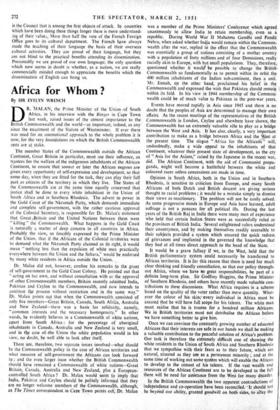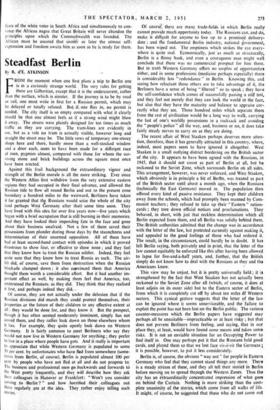Africa for Whom ?
By SIR EVELYN WRENCH R. MALAN, the Prime Minister of the Union ,of South Africa, in his interview with the Burger in Cape Town last week, raised issues of the utmost importance to the British Commonwealth and the world—as important, indeed, as any since the enactment of the Statute of Westminster. If ever there was need for an unemotional approach to the whole problem it is now, for the very foundations on which the British Commonwealth rests are at stake.
The member Stales of the Commonwealth outside the African Continent, Great Britain in particular, must use their influence, as trustees for the welfare of the indigenous inhabitants of the African Continent, to ensure that sooner or later the African negroes are given every opportunity of self-expression and development, so that some day, when they are fitted for the task, they can play their full part as citizens of the territory in which they live. The States of the Commonwealth are at the same time equally concerned that justice shall be done to every white inhabitant in the Union of South Africa and in Southern Rhodesia. The advent to power in the Gold Coast of the Nkrumah Party, which demands immediate and complete self-government, with the rather cautious approval of the Colonial Secretary, is responsible for Dr. Malan's statement that Great 'Britain and the United Nations between them were " killing " the Commonwealth. What happens in the Gold Coast is naturally a matter of deep concern to all countries in Africa. Probably the view, so forcibly expressed by the Prime Minister of the Union. that if the Africans of the Colonial territories were to demand what the Nkrumah Party claimed as its right, it would mean " nothing less than the expulsion of white men practically everywhere between the Union and the Sahara," would be endorsed by many white residents in Africa outside the Union. , Dr. Malan did not, however, confine his remarks to the grant of self-government to the Gold Coast Colony. He pointed out that " acting on her own, and without consultation with or the approval of other Commonwealth members, Britain recently admitted India, Pakistan and Ceylon to the Commonwealth, and now intends to continue tbe process without restriction and in the same way." Dr. Malan points out that when the Commonwealth consisted of only five members—Great Britain, Canada, South Africa, Australia and New Zealand—there was a basis for solidarity, namely, " common interests and the necessary homogeneity." In other words, he evidently believes in a Commonwealth of white nations, apart from South Africa ; for the percentage of aboriginal inhabitants in Canada, Australia and New Zealand is very small, and in tbe case of-the Union the white population would in his view, no doubt, be well able to look after itself.
There are, therefore, two separate issues involved—what should be the Commonwealth policy in the case of African territories and what measure of self-government the Africans can look forward to ; and the even larger issue whether the British Commonwealth should have remained a Commonwealth of white nations—Great Britain, Canada, Australia and New Zealand, plus .a European- controlled South Africa ? Dr. Malan would seem to imply that India, Pakistan and Ceylon should be politely informed that they are no longer welcome members of the Commonwealth, although, as The Times correspondent in Cape Town points out, Dr. Malan
was a member of the Prime Ministers' Conference which agreed unanimously to allow India to retain membership, even as a republic. During World War II Mahatma Gandhi and Pandit Nehru, when asked whether India would remain within the Common- wealth after the war, replied to the effect that the Commonwealth was essentially a group of nations consisting of a mother country with a population of forty millions and of four Dominions, really racially akin to Europe, with but small populations. They, therefore, questioned whether it would be possible to change the British Commonwealth so fundamentally as to permit within its orbit the 400 million inhabitants of the Indian sub-continent, then a unit. Mr. Jinnah, on the other hand, proclaimed his belief in the Commonwealth and expressed the wish that Pakistan should remain within its fold. In his view in 1944 membership of the Common- wealth could be of much value to Pakistan in the post-war years.
Events have moved rapidly in Asia since 1945 and there is no doubt that the peoples of Asia are determined to manage their own affairs. As the recent meetings of the representatives of the British Commonwealth in London, Ceylon and elsewhere have shown, the Commonwealth has an extremely valuable role to play as a bridge between the West and Asia. It has also, clearly, a very important contribution to make as a bridge between Africa and theyest at the present time. The slogan " Africa for the Africans " will, undoubtedly, make a wide appeal to the inhabitants of that Continent, whatever their present state of development, as the cry of " Asia for the Asians," raised by the Japanese in the recent war, did. The African Continent, with the aid of Communist propa- ganda, might well become a battlefield between the white and coloured races unless concessions are made in time.
Opinion in South Africa, both in the Union and in Southern Rhodesia, is sensitive to criticism from Europe, and many South Africans of both Dutch and British descent are giving serious thought to racial problems ; it would be a mistake simply to dismiss their views as reactionary. The problem will not be easily solved. As some progressive minds in Europe and Asia have learned, adult suffrage is not a panacea for all political ills. During the last years of the British Raj in India there were many men of experience who held that certain Indian States were as successfully ruled as the provinces of British India. Several enlightened rulers understood their countrymen, and by making themselves readily accessible to their subjects provided a system which ensured the quick redress, of grievances and implanted in the governed the knowledge that they had at all times direct approach to the head of the State.
It would be a grave fallacy if we, in the West, held that the British parliamentary system could necessarily be transferred to African territories. It is for this reason that there is need for much clear thinking and friendly consultation, so that our policy through- out Africa, where we have No great responsibilities, be part of a definite long-term plan. Sir Godfrey Huggins, the Prime Minister of Southern Rhodesia, and others have recently made valuable con- tributions to these discussions. What Africa requires is a scheme based on the quality of the voter rather than mere quantity. What- ever the colour of his skin; every individual in Africa must be assured that he will have full scope for his talents. The white man must realise that he. is trustee for a hundred million Africans. We in British territories must not detribalise the African before we have something better to give him.
Once we can convince the constantly growing number of educated Africans that their interests are safe in our hands we shall be making a valuable contribution to the peaceful solution of Africa's problem. Our task is therefore the extremely difficult one of showing the white residents in the Union of South Africa and Southern Rhodesia that we sympathise with their fears as to their future, which arc natural, situated as they are as a permanent minority ; and at the same time of working out some systim which will enable the African to develop to the utmost of his talents. If the vast wealth and resources of the African Continent are to be developed to the full there will be need for assistance from the West for many decades. In the British Commonwealth the two apparent contradictions of independence and co-operation have been reconciled. It should not be beyond our ability, granted goodwill on both sides, to allay the fears of the white voter. in South Africa and simultaneously to con- % ince the African negro that Great Britain will never abandon the principles upon which the Commonwealth was founded. The African must be assured that soorter or later the utmost self- e\pression and freedom awaits him as soon as he is ready for them.



































 Previous page
Previous page